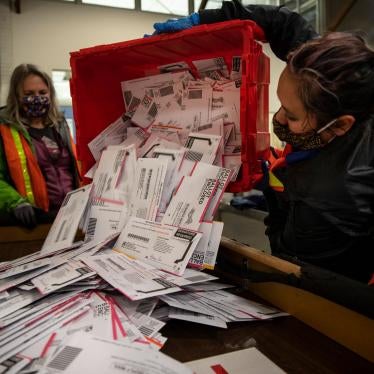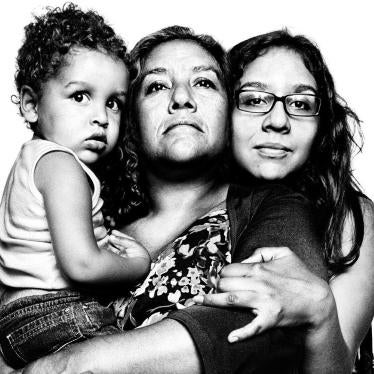The Honorable Gavin Newsom
Governor, State of California
Sacramento, California 95814
Re: Human Rights Watch Supports AB 2195 (Jones-Sawyer), The Alternate Plea Act
Dear Governor Newsom,
I write on behalf of Human Rights Watch to respectfully request that you sign into law AB 2195 (Jones-Sawyer), The Alternate Plea Act, to create an alternative plea for those charged with certain drug offenses. The Alternate Plea Act would cover many common drug offenses, and give prosecutors discretion to offer a modified public nuisance plea as a substitute for a drug charge including possession and drug sales. The public nuisance plea would carry the same criminal penalty but without triggering the collateral consequences for both immigrants and citizens.
Human Rights Watch is non-profit, independent organization that investigates human rights violations in more than 100 countries around the world, including the United States. For decades, we have advocated for policy reforms to end human rights abuses in the US at the federal, state, and local levels, including in the state of California. We support AB 2195 for three main reasons.
First, AB 2195 would contribute to mitigating some of the catastrophic collateral consequences resulting from the widespread and racially discriminatory enforcement of drug laws in the state and country. Drug possession for personal use remains by far the offense for which people are arrested the most in the United States, with 1.35 million people arrested for drug possession in the United States in 2019.[1] The racial disparities in these arrests remain acute.[2] Black adults are more than two-and-a-half times as likely as white adults to be arrested for possession of any type of drug in the US.[3] In 2014, Black people accounted for just 14 percent of people who used drugs in the previous year, but close to a third of those arrested for drug possession.[4] In 39 states analyzed by Human Rights Watch in 2016, Black adults were more than four times as likely to be arrested for marijuana possession as white adults.[5] An April 2020 ACLU report found that in 2018, Black people were 3.64 times more likely to be arrested for marijuana possession than white people.[6] This issue affects a large swath of Californians. In 2019, one in four California misdemeanor arrests (190,958 arrests) and one in ten felony arrests (26,854 arrests) were for drug offenses.[7]
If the proposed bill became law, prosecutors could exercise discretion to prevent or mitigate collateral consequences of drug convictions such as: eviction from housing, an essential resource, denial of professional licenses, and denials of parental rights. Although California policy is to promote successful re-entry and rehabilitation of people convicted of any offense, the collateral consequences of convictions often block this effort. While a conviction for public nuisance can still be considered in all of these circumstances, it will reduce the absolute punishments and bars to services and resources.
Second, AB 2195 would specifically help to mitigate the particular harm suffered by immigrants and their US citizen family members as a result of these convictions. In 2015, Human Rights Watch analyzed data received from Immigration and Customs Enforcement (ICE) in response to a request under the Freedom of Information Act.[8] Between 2007 and 2012, almost 266,000 deported immigrants had a drug conviction as their most serious conviction; of those, over 34,000 were for marijuana possession. Many of the people Human Rights Watch interviewed had US citizen family, who also suffered as a result of the deportation of their loved ones. In a 2017 report, Human Rights Watch estimated, based on ICE data, that more than 10,000 parents of US citizen children were locked up in immigration detention in California each year.[9] For California’s large non-citizen population, drug convictions can have devastating consequences, which can result in the permanent separation of families, in violation of the human right to family unity and the requirement that punishment be proportional to the offense.[10] Even low-level convictions such as infractions or misdemeanor possession can subject immigrants to mandatory ICE detention and deportation.
Third, the Supreme Court’s opinion in Pereida v. Wilkinson, 141 S. Ct. 754, (March 4, 2021), heightened the need for California to reform its laws to offer some mitigation to the rights-abusive consequences of drug convictions for immigrants and their families. The court’s opinion overturned Ninth Circuit precedent and eliminated the last immigration-neutral plea option for a drug charge in California criminal proceedings (which was to plead guilty to a drug offense, but not to identify the specific substance in the plea). Since Pereida, California prosecutors have been stripped of discretion, even when they believe that the best way to seek justice would be to prevent a defendant from facing deportation or other collateral consequences in a specific case.
As California continues to address the historic and discriminatory impacts of the drug war, AB 2195 (Jones-Sawyer) provides a much-needed human rights-respecting tool for both defense and prosecutors to use when working to resolve individual cases. For these reasons, Human Rights Watch supports AB 2195 (Jones-Sawyer). If you have any questions regarding our position, please contact: US Program Managing Director Alison Leal Parker by phone at +1 917 535-9796 or via email at parkera@hrw.org.
Respectfully,
Alison Leal Parker, JD
Managing Director
US Program, Human Rights Watch
[1] Common Sense for Drug Policy, “Total Annual Drug Arrests in The United States by Offense Type,” 2021, https://www.drugpolicyfacts.org/node/234 (accessed August 18, 2022).
[2] Thomas J. Rachko, Jr., “US Congress Should End Marijuana Prohibition,” Human Rights Watch Dispatch, August 25, 2020, https://www.hrw.org/news/2020/08/25/us-congress-should-end-marijuana-prohibition.
[3] Human Rights Watch, Every 25 Seconds: The Human Toll of Criminalizing Drug Use in the United States, (New York: Human Rights Watch, 2016), https://www.hrw.org/report/2016/10/12/every-25-seconds/human-toll-criminalizing-drug-use-united-states#4671 (accessed August 18, 2022).
[4] Ibid.
[5] Ibid.
[6] American Civil Liberties Union, “A Tale of Two Countries: Racially Targeted Arrests in the Era of Marijuana,” April 16, 2020, https://www.aclu.org/press-releases/new-aclu-report-despite-marijuana-legalization-black-people-still-almost-four-times (accessed August 18, 2022).
[7] California Department of Justice, Crime in California 2019, Tables 21 and 25. Retrieved from https://data-openjustice.doj.ca.gov/sites/default/files/2020-06/Crime%20In%20CA%202019.pdf
[8] Human Rights Watch, A Price Too High: US Families Torn Apart by Deportations for Drug Offenses (New York: Human Rights Watch, 2015), https://www.hrw.org/report/2015/06/16/price-too-high/us-families-torn-apart-deportations-drug-offenses.
[9] Human Rights Watch, “I Still Need You”: The Detention and Deportation of California Parents, (New York: Human Rights Watch, 2017), https://www.hrw.org/sites/default/files/report_pdf/uscaliforniaimmigration0517_web_0.pdf, p.2.
[10] Human Rights Watch, Forced Apart: Families Separated and Immigrants Harmed by US Deportation Policy (New York: Human Rights Watch, 2007), sec. VI: “US Deportation Policy Violates Human Rights,” http://www.hrw.org/node/10856/section/8.







